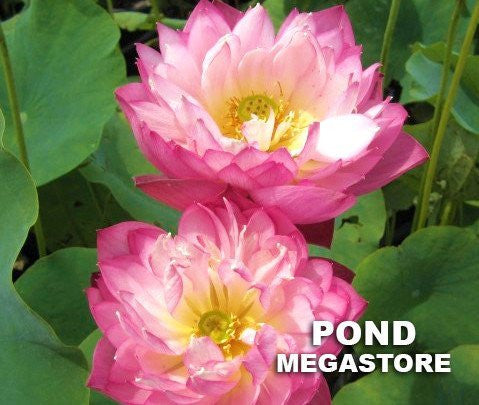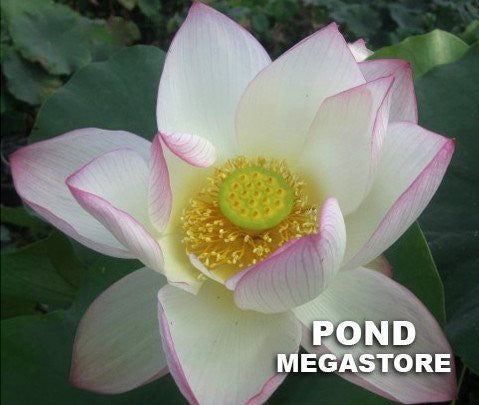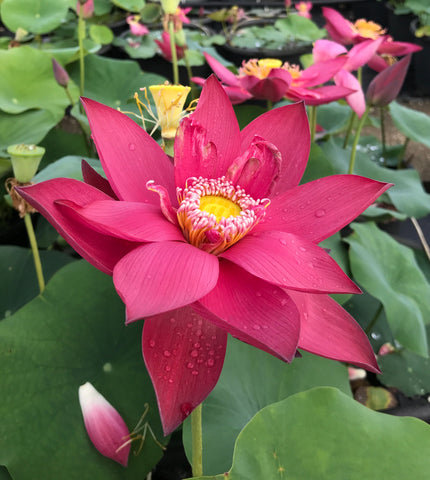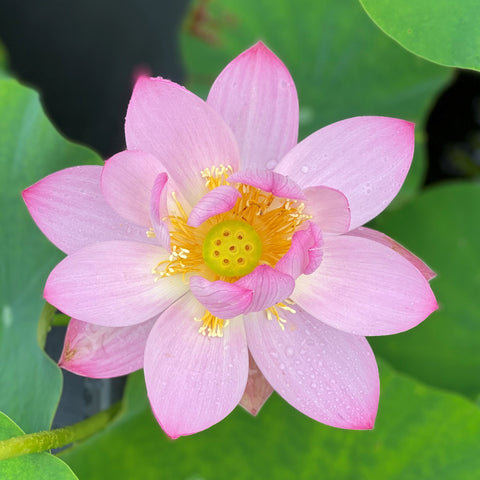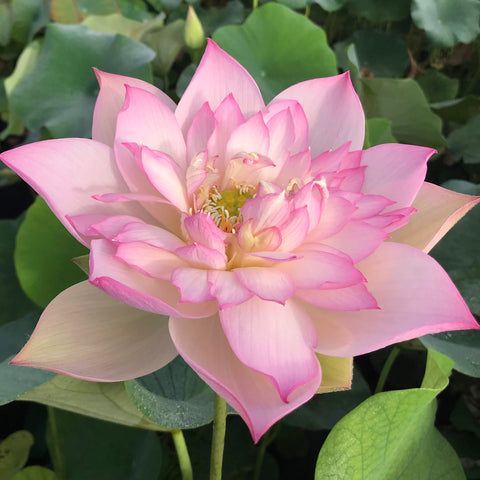Elite Red Lotus has row upon row of ruffled, fancy outer petals and light pink inner petals which give it a luminous quality. Elite Red Lotus has an exotic, spicy fragrance to add to its allure! This unique and unusual lotus hybrid will grow 2 1/2 - 3 feet tall when planted in a wide container (14 - 24 inches in diameter) or wider. Elite Red Lotus is an ornate variety that is sure to please! Elite Red Lotus grows to 3 feet tall.
A digital version of our
New Lotus Booklet now comes FREE with all Lotus Purchases!
Plant in wide container (14 - 24 inches wide or wider) with loam soil and 3 - 4 inches of water over the soil, plant in full sun and fertilize monthly with fertilizer tabs once plant is established with aerial leaves growing out of the water.
Pondmegastore Tip There are many different factors that determine the size and height of your lotus. The lotus variety will determine, to a degree, how large your lotus will grow but other factors also play a part in determining how tall your lotus will grow
1.) Pot size
2.) Sunlight
3.) Fertilizer
4.) Temperatures
Choose a variety that will work well in the space provided. The wider the container, the taller your lotus will grow and the more blooms you will have. Lotus need plenty of sunlight, provide as much sunlight as possible (8+ hours per day). Fertilizer is important as well, never fertilize your lotus until you have aerial leaves growing out of the water. If you fertilize your lotus too early, you can kill your lotus. The leaves of your lotus should be a beautiful shade of green, if not, you are probably lacking nutrients and you should fertilize your lotus. (We recommend Waterlily World Fertilizer Tabs + Humates for robust plant growth and best bloom). Start your lotus in the month of May when temperatures are consistently in the 50's or better at night and day time temperatures are in the 70's. Starting your tuber in the month of May allows the lotus to make and store enough energy to over-winter. Your lotus should grow and bloom the very first year!
What Is Loam Soil?
Loam soil is a good mixture of Topsoil and Sand
If you are lucky enough to have good topsoil in your backyard, by all means, use your topsoil. All you will have to do is add fertilizer. If you are not so lucky--and your backyard is sand or heavy red or yellow clay, you can mix up a batch of loam soil.
You can create your own loam soil by mixing these two ingredients together
- 2/3 Inorganic Topsoil (Little or no organic material added)
- 1/3 Pool Filter Sand
Mix together thoroughly with a little water. Your soil should clump when squeezed. If your soil is mixed properly, it will not muddy your pond water.
You can purchase inexpensive bags of inexpensive / poor Topsoil at Lowes or Home-Depot. Good soil clumps together as a ball in your hand with only a little moisture.
Don't buy brands like Scott's or Miracle-Gro, as they will contain too much organic matter that can foul your water. Buy an unbranded bag of topsoil instead.
You can purchase Pool Filter Sand at any store that sells pool supplies.
Loam soil is well suited for all aquatic plants (except oxygenators). Oxygenators rarely need to be planted, just anchored in the substrate or in a container filled with sand or 1/8 inch pea gravel.
Sand holds little water but does allow for aeration and drainage.
Some DO's and DON'TS regarding Aquatic Planting Soil
DO NOT use potting soils ( as they are too light and will float right out of the pot). Potting Soil has organic material that will rot and foul your water!
DO NOT add too much composted material (as it is too rich in organic matter and it will ferment underwater and destroy the ecology of your pond).
DO NOT use 100% calcined clay as there is no nutritional value in calcined clay.
DO NOT add rocks, stones or pebbles to the top of your planting container as this will inhibit the growth of your plants. Plants do not grow in rocks and stones in nature!
DO NOT purchase API Aquatic Planting Media or Microbe-lift Aquatic Planting Media as these products are NOT suitable for waterlilies, lotus or most other pond plants. They are suitable for submerged grasses ONLY!




